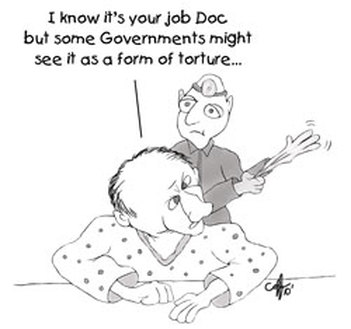
An 18 year long controversy has been resolved.
1) Finasteride prevents prostate cancer ( by about 30 % )
2) Finasteride does not increase high grade cancers or death. It just doesn't !
We used to think may it did, but now we know that it don't !
The drug is sold as Proscar by Merck & Co. and in generic form as finasteride to treat urinary problems from enlarged prostates. It's also sold in a lower dose as Propecia to treat hair loss.
A decade ago, the drug was found to cut the risk of prostate cancer. But there was a small rise in aggressive tumors among its users. Some researchers said that by shrinking the prostate, the drug was just making these tumors easier to find in a biopsy sample — not causing them.
Now, with 18 years of follow-up from that earlier study, researchers report that men on the drug were no more likely to die than those not taking it.
Dr. M LeFevre wrote an editorial that appears with the study in Thursday's New England Journal of Medicine. He is one of the leaders of the U.S. Preventive Services Task Force, an independent panel of doctors who advise the federal government. The group has not taken a stance on finasteride for prevention but has advised against screening with PSA blood tests.
Screening does more harm than good, the panel has said, because although 240,000 new prostate cancers are diagnosed each year in the United States, only about 30,000 prove fatal. That means many men are treated for cancers that grow too slowly to be life-threatening, and often suffer sexual and urinary problems as a result.
For the new analysis, researchers tracked the study participants for 18 years in all since enrolment began. Only about 10 per cent of men on finasteride developed prostate cancer versus 15 per cent of those on dummy pills. Aggressive tumors were found in 3.5 per cent of men on the drug versus 3 per cent of the others. Yet 78 per cent of both groups were alive after 15 years.
That means the drug cannot be recommended to prolong life, just to ease suffering by preventing disease, LeFevre said.
"You may be preventing cancers that don't need to be prevented" because so few are life-threatening, but screening is finding these tumors anyway and leading to unnecessary treatments, he said. Reducing that number is a valid reason to use a prevention drug, he said.
Finasteride's other impact is financial. Proscar and a similar drug, GlaxoSmithKline PLC's Avodart, cost about $4 a pill. Generic finasteride is available for less. Insurers cover it when prescribed to treat urinary problems but may not pay if it's used solely for cancer prevention.
The drug also can cause hot flashes, fatigue, weakness, low sex drive and trouble having sex.
"A man certainly needs to know what he's getting into if he decides to take this," LeFevre said
1) Finasteride prevents prostate cancer ( by about 30 % )
2) Finasteride does not increase high grade cancers or death. It just doesn't !
We used to think may it did, but now we know that it don't !
The drug is sold as Proscar by Merck & Co. and in generic form as finasteride to treat urinary problems from enlarged prostates. It's also sold in a lower dose as Propecia to treat hair loss.
A decade ago, the drug was found to cut the risk of prostate cancer. But there was a small rise in aggressive tumors among its users. Some researchers said that by shrinking the prostate, the drug was just making these tumors easier to find in a biopsy sample — not causing them.
Now, with 18 years of follow-up from that earlier study, researchers report that men on the drug were no more likely to die than those not taking it.
Dr. M LeFevre wrote an editorial that appears with the study in Thursday's New England Journal of Medicine. He is one of the leaders of the U.S. Preventive Services Task Force, an independent panel of doctors who advise the federal government. The group has not taken a stance on finasteride for prevention but has advised against screening with PSA blood tests.
Screening does more harm than good, the panel has said, because although 240,000 new prostate cancers are diagnosed each year in the United States, only about 30,000 prove fatal. That means many men are treated for cancers that grow too slowly to be life-threatening, and often suffer sexual and urinary problems as a result.
For the new analysis, researchers tracked the study participants for 18 years in all since enrolment began. Only about 10 per cent of men on finasteride developed prostate cancer versus 15 per cent of those on dummy pills. Aggressive tumors were found in 3.5 per cent of men on the drug versus 3 per cent of the others. Yet 78 per cent of both groups were alive after 15 years.
That means the drug cannot be recommended to prolong life, just to ease suffering by preventing disease, LeFevre said.
"You may be preventing cancers that don't need to be prevented" because so few are life-threatening, but screening is finding these tumors anyway and leading to unnecessary treatments, he said. Reducing that number is a valid reason to use a prevention drug, he said.
Finasteride's other impact is financial. Proscar and a similar drug, GlaxoSmithKline PLC's Avodart, cost about $4 a pill. Generic finasteride is available for less. Insurers cover it when prescribed to treat urinary problems but may not pay if it's used solely for cancer prevention.
The drug also can cause hot flashes, fatigue, weakness, low sex drive and trouble having sex.
"A man certainly needs to know what he's getting into if he decides to take this," LeFevre said